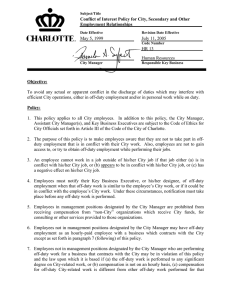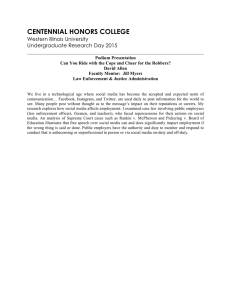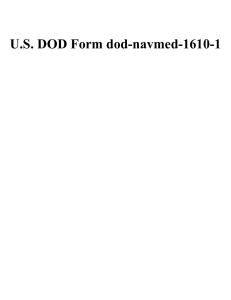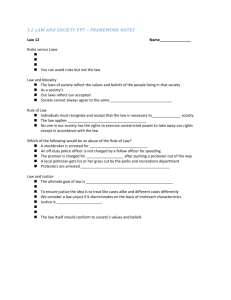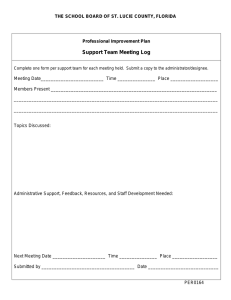Personnel Outside Employment (6.26
advertisement
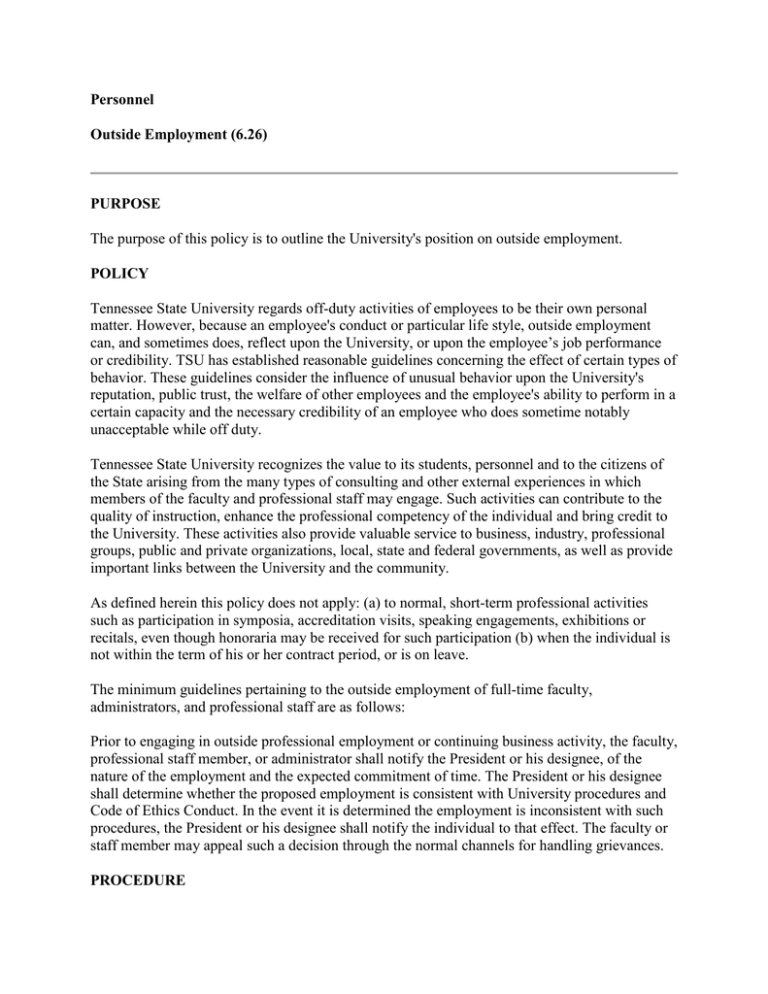
Personnel Outside Employment (6.26) PURPOSE The purpose of this policy is to outline the University's position on outside employment. POLICY Tennessee State University regards off-duty activities of employees to be their own personal matter. However, because an employee's conduct or particular life style, outside employment can, and sometimes does, reflect upon the University, or upon the employee’s job performance or credibility. TSU has established reasonable guidelines concerning the effect of certain types of behavior. These guidelines consider the influence of unusual behavior upon the University's reputation, public trust, the welfare of other employees and the employee's ability to perform in a certain capacity and the necessary credibility of an employee who does sometime notably unacceptable while off duty. Tennessee State University recognizes the value to its students, personnel and to the citizens of the State arising from the many types of consulting and other external experiences in which members of the faculty and professional staff may engage. Such activities can contribute to the quality of instruction, enhance the professional competency of the individual and bring credit to the University. These activities also provide valuable service to business, industry, professional groups, public and private organizations, local, state and federal governments, as well as provide important links between the University and the community. As defined herein this policy does not apply: (a) to normal, short-term professional activities such as participation in symposia, accreditation visits, speaking engagements, exhibitions or recitals, even though honoraria may be received for such participation (b) when the individual is not within the term of his or her contract period, or is on leave. The minimum guidelines pertaining to the outside employment of full-time faculty, administrators, and professional staff are as follows: Prior to engaging in outside professional employment or continuing business activity, the faculty, professional staff member, or administrator shall notify the President or his designee, of the nature of the employment and the expected commitment of time. The President or his designee shall determine whether the proposed employment is consistent with University procedures and Code of Ethics Conduct. In the event it is determined the employment is inconsistent with such procedures, the President or his designee shall notify the individual to that effect. The faculty or staff member may appeal such a decision through the normal channels for handling grievances. PROCEDURE The proposed outside professional employment or continuing business activity: 1. must not interfere with assigned duties and responsibilities. 2. must not constitute a conflict of interest or compete with the education, research or public service programs of the University. 3. must not be undertaken with the claim that the individual is an official representative of Tennessee State University. 4. if involving the use of University equipment, facilities or services must have University approval and provide for compensating the University at the rates established by the University. Off-Duty Conduct A. Employees who engage in or are associated with illegal, immoral or inimical conduct, the nature of which adversely affects the University or their own ability or credibility to carry out their employment responsibilities, may be subject to disciplinary action including termination. B. Employees may engage in off-duty employment provided: 1. Written approval is granted in advance by the employee's supervisor and the President or his designee. 2. The employment does not conflict with the employee's work schedules, duties and responsibilities. 3. The employment does not create a conflict of interest. 4. The employment does not create a detrimental effect upon the employee’s work performance with the university. 5. The employment does not involve conducting business during hours of employment with the University unless expressly authorized. Self-employment is considered off-duty employment and falls under the same conditions as other off-duty employment, with the addition of the restriction that employment does not involve ownership of a private business that is incompatible with an employee's position at the University. C. Employees wishing to engage in off-duty employment are required to submit a written request explaining pertinent details to their supervisor. If approved by the supervisor and the President or his designee, copies of the request will be given to the employee and the supervisor and entered in to the employee's personnel file. Upon any subsequent change in off-duty employment, including the employer, type of work performed, modification of work schedule or work location, the employee will be required to submit a new or revised written request for off-duty employment and it will be processed as described above. D. An employee who sustains an injury or illness in connection with off-duty employment will: 1. Not be entitled to receive workers' compensation benefits provided by the University. 2. Not accrue credit for vacation, sick leave or any other discretionary employment benefits during a period of absence resulting from such injury or illness. 3. Not be entitled to the normal contribution by the University toward health care benefit premiums during a period of absence resulting from such injury or illness. In those cases where an off-duty, employment-related injury or illness results in an employee's temporary disability, the employee must either request and obtain a leave of absence without pay, request and use accrued paid time off whereby items 3 and 4 above would not apply or be subject to termination by the University due to lack of availability for work. E. An employee's authorization to engage in off-duty employment may be revoked at anytime and at the sole discretion of the University. Such revocations will generally be based upon finding the conditions set forth herein have not been met. REFERENCE TBR Policy No. 5:01:05:00
